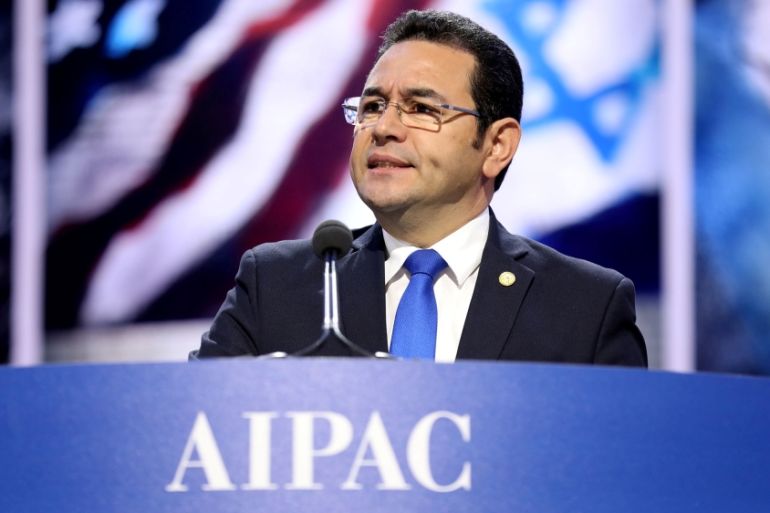Guatemala announces embassy move to Jerusalem in May
Guatemala’s President Jimmy Morales said he will move his country’s embassy to Jerusalem two days after the US will.

Guatemala’s President Jimmy Morales has announced that he will move his country’s embassy from Tel Aviv to Jerusalem on May 16, two days after the United States is scheduled to do the same in a controversial move that has drawn worldwide condemnation.
On Tuesday, Hanan Ashrawi, member of the Palestinian Liberation Organization’s (PLO) Executive Committee condemned Guatemala’s announcement as “dangerous and provocative”.
Keep reading
list of 4 itemsArmenia and Azerbaijan agree on ‘historic’ return of villages
US policy is leading to a wider war: Jeffrey Sachs on Middle East tensions
Has Israel attacked Iran’s Isfahan province? What we know so far
Speaking on Monday at the annual American Israel Public Affairs Committee (AIPAC) conference in Washington, DC, Morales said that the embassy move “strongly evidences Guatemala’s continued support and solidarity with the people of Israel”.
“In May of this year, we will celebrate Israel’s 70th anniversary, and under my instructions, two days after the United States moves its embassy, Guatemala will return and permanently move its embassy to Jerusalem,” he said.
Condemnation
The international community does not recognise Israel’s annexation of occupied East Jerusalem, and in December 2017, 128 countries backed a non-binding UN General Assembly resolution that called for the US to rescind its move.
Guatemala was only one of the handful of countries to vote against the resolution after the US threatened to withdraw financial aid to countries who voted otherwise.
“By taking such a step that defies international law, Mr Morales, also besieged at home by charges of corruption and abuse of power, has partnered with Israeli Prime Minister Benjamin Netanyahu and US President Donald Trump in violating international law and undermining the chances of peace,” Ashrawi said in an official statement.
She also urged the international community “to intervene and hold the Israeli occupation and its partners to account for such flagrant violations and provocative actions that fuel the flames in an already volatile situation.”
Following Trump
Trump’s administration announced their recognition of Jerusalem as Israel’s capital last December, breaking with decades of official US policy.
The US decision led to the outbreak of protests throughout the occupied Palestinian territories, resulting in the deaths of at least 16 Palestinians by the Israeli army during the same month.
Morales thanked US President Donald Trump for “leading the way … His courageous decision has encouraged us to do what is right,” he said.
On May 15, Palestinians will mark Nakba Day, the annual commemoration of the displacement that preceded and followed the Israeli Declaration of Independence in 1948.
The embassy move will take place on May 16, with the Guatemalan president adding that he is “sure many other countries will follow in our steps”.
It was also the first country to back Trump’s decision on Jerusalem. The country’s close relations with the US are largely defined by its dependency on US financial support.
Furthermore, the local economy depends on money sent by hundreds of thousands of Guatemalans living in the US, with remittances reaching $8bn in the last year – roughly three-quarters of the Guatemalan budget.
Reversed decision
Prior to 1980, 13 countries had their embassies in Jerusalem. But after Israel passed a law declaring Jerusalem as its “indivisible and eternal capital”, a UN Security Council resolution called for these countries to move their embassies to Tel Aviv.
During his time in office from 1993-1996, Guatemala’s former President Ramiro de Leon Carpio – a big supporter of Israel – had ordered the transfer of his country’s embassy from Tel Aviv to Jerusalem.
He was forced to reverse his decision after Muslim-majority countries threatened to suspend buying Guatemala’s biggest export, cardamom.